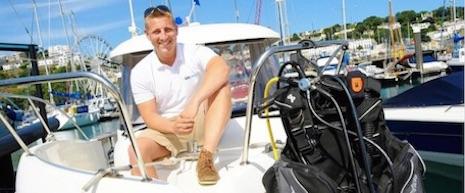
By Tom Birbeck, ARC Marine—According to a WWF report, our oceans are worth at least $24 trillion, so how can we afford not to protect and invest in it like any other business?
Business has played the most significant role in damaging our seas. For example, single use plastics designed for consumer goods, not to mention the overfishing crisis fuelled by our population’s desire for more fish at a cheaper price and on a scale our oceans simply can’t cope with. The ocean needs repairing and protecting, just like we do with heritage buildings and our land-based natural habitats. Specialists are employed to carry out this work and the same is needed for the oceans. If we set the challenge to the business world to tackle this problem not only will this provide a living for a whole new sector, but also everyone on the planet will gain from the increase in productivity from our seas for generations to come.
There is a desperate need for large scale and worldwide ocean conservation work to be carried out and these problems cannot be solved by a handful of charities whose limited capacity and strict rules dictate what they can and can’t do with the donated funds. Charities have done a fantastic job in raising awareness for the problems we are facing and getting the ball rolling with conservation work. We now need rapid innovation and socially responsible companies whose creativity and drive to become the best in their sector will help solve the problems we are facing. This will spark the flame for a new industry and, as with most capitalist industries with a healthy competition, it brings better products, a higher quality service and, as a result, healthier more productive oceans. Put simply, we need to make it pay to protect.
At ARC Marine we are developing a number of products to tackle our oceans’ problems. These include modules, which are marine-friendly concrete structures built to repair damaged natural reef systems, which also serve as a mooring point for pleasure boats to attach onto. This eliminates the need to lay anchors, which destroys fragile reef systems and delicate sea grass beds. The modules also serve as an anti-trawling device or a “sleeping policeman” to stop illegal fishing in marine protected areas. These permanent seabed structures save government bodies time and resources on patrolling protected waters. It is impossible to police these areas 24/7 and the illegal fishing industry knows this. It is this multi purpose use that we believe can incorporate artificial reefs into established markets and start protecting the marine environment. Once reef sites have been colonised and nature’s food chain takes over, the overspill from these protected sites will, of course, be beneficial to the fishing and tourism industries due to the increase of fish stocks and cleaner waters.
There is also the growing market for sustainable fishing practices. Divers collecting by hand suitable fish and shellfish, result in zero by catch compared to traditional fishing methods and without damaging the seabed, which is the case when using beam trawlers. Permits and catch limits can be set and adjusted as fish stocks fluctuate and new jobs will be created through self employed divers and fishing vessels who take divers to designated “reef farms” and negotiate a share of what the divers catch.
There is this apparent stigma that you can’t genuinely care about the oceans’ problems if you are doing it to make money. It seems nonsensical that people cannot care about the ocean but also want to profit from the hard work it takes. We need to stop looking at these problems as separate issues and find a way for the planet, people and profit to work together.
Tom Birbeck is co-founder, ARC Marine
TriplePundit has published articles from over 1000 contributors. If you'd like to be a guest author, please get in touch!














